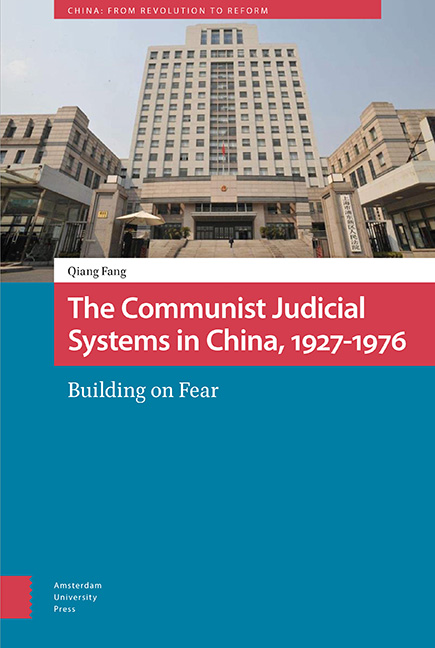Book contents
- Frontmatter
- Contents
- List of Tables
- Dedication
- Acknowledgement
- Acronyms
- Introduction: Building on Fear
- 1 Born in Blood: Origin of the Communist Judicial System in China, 1927–1935
- 2 Cornerstone or Aberration?: The Communist Judicial System during Wars with Japan and the GMD, 1936–1949
- 3 From “Excessive Lenience” to Harshness: The Communist Judicial System in the Early PRC, 1949-1952
- 4 A Deliberate Purge: Legal Reform in the Early PRC, 1952-1953
- 5 A Golden Age?: The Communist Judicial System in China, 1953-May 1957
- 6 The Great Leap of Law: The Communist Judicial System in China, 1957-1965
- 7 Not the Worst Period of Law: The Communist Judicial System in the Cultural Revolution, 1966-1976
- Conclusion: From Party’s Fear to People’s Fear
- Bibliography
- Index
3 - From “Excessive Lenience” to Harshness: The Communist Judicial System in the Early PRC, 1949-1952
Published online by Cambridge University Press: 18 June 2021
- Frontmatter
- Contents
- List of Tables
- Dedication
- Acknowledgement
- Acronyms
- Introduction: Building on Fear
- 1 Born in Blood: Origin of the Communist Judicial System in China, 1927–1935
- 2 Cornerstone or Aberration?: The Communist Judicial System during Wars with Japan and the GMD, 1936–1949
- 3 From “Excessive Lenience” to Harshness: The Communist Judicial System in the Early PRC, 1949-1952
- 4 A Deliberate Purge: Legal Reform in the Early PRC, 1952-1953
- 5 A Golden Age?: The Communist Judicial System in China, 1953-May 1957
- 6 The Great Leap of Law: The Communist Judicial System in China, 1957-1965
- 7 Not the Worst Period of Law: The Communist Judicial System in the Cultural Revolution, 1966-1976
- Conclusion: From Party’s Fear to People’s Fear
- Bibliography
- Index
Summary
Abstract
After the CCP and its army conquered mainland China, the Party did not immediately abolish all GMD laws and legal mechanisms as it had once vowed to do. This chapter shows that the Party chose instead to try to make a smooth transition in the judicial system by retaining most former Republican judges and lawyers. As a result, many “counterrevolutionaries” were tried and punished more leniently in accordance with Republican laws. The mild legal policy underwent an abrupt shift shortly after the eruption of the Korean War. Facing a possible GMD effort to retake the mainland, the military commissions, police, procuracy, and courts launched fierce sanctions against counterrevolutionaries with more forced labor and executions. Furthermore, the court reversed its previous balanced handling of disputes between workers and capitalists by siding with labor against management.
Keywords: abolition of GMD laws, “excessive” lenience, SPC guidelines for handling cases, self-reform, anti-counterrevolutionary campaign
The legal system in the early People's Republic of China (PRC) was nothing but a natural and logical extension of its precursor in the revolutionary war period (i.e. 1927-1949). Both were consistently based on the Party ideology, goals, class line, and, above all, the Party's fundamental insecurity and its fear of the loss of power. The major difference is that the early PRC was no longer just a regional and fledgling political power, it now controlled almost all of mainland China. Yet, as in previous periods, the Chinese Communist Party (CCP) continued to fear sabotage from within and threats from without.
From the outset, the CCP had learned from Marx and Lenin that a socialist government and public ownership of the principal means of production was incompatible with capitalism and private ownership. Therefore, in an aspirational Communist China, all of the capitalist state apparatus, including its army, police, and judicial system, had to be scrapped. In January 1949, as the People's Liberation Army (PLA) was poised to take over China, Mao declared that the CCP would abolish all the Nationalist Party (Guomindang, or GMD) laws and legal institutions. “Any legal institution, constitution, and law can only be created by a certain class in the midst of a class struggle,” the CCP proclaimed in a statement, “the nature of the constitution and legal institution [in a country] is determined solely by the nature of the polity.”
- Type
- Chapter
- Information
- The Communist Judicial System in China, 1927–1976Building on Fear, pp. 109 - 142Publisher: Amsterdam University PressPrint publication year: 2021



